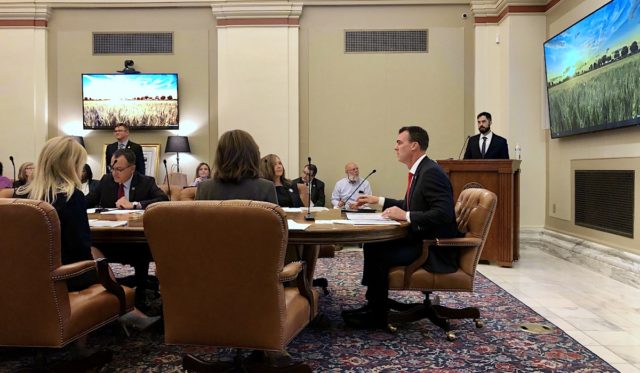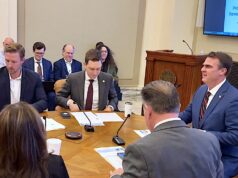
After Monday’s meeting of the state Board of Equalization, Oklahoma Gov. Kevin Stitt answered questions from reporters about a variety of topics, including state financial matters, his recent trip to Washington and whether he’d like to go back in 2025 as president.
The transcript below highlights the governor’s responses on a few of those topics, in particular his D.C. trip. Stitt flew to Washington on Sunday, June 13, and returned late Tuesday, June 15, according to Charlie Hannema, his communications chief.
Hannema said Stitt met with Oklahoma’s entire congressional delegation, as well as administrators with the U.S. Department of Commerce and Israel’s ambassador to the U.S., Gilad Erdan. Stitt also briefly spoke with Secretary of the U.S. Army Christine Wormuth and Army Chief of Staff Gen. James C. McConville.
During Monday’s press gaggle, Stitt answered a series of questions from CNHI reporter Janelle Stecklein about the incentives offered to Canoo, an electric-vehicle manufacturer that recently announced it will build a plant in Pryor’s MidAmerica Industrial Park. In her subsequent story, Stecklein chronicled Stitt’s remarks and the questions legislative leaders have about the reported tax incentives, which the company’s CEO said exceed $300 million.
Meanwhile, the following questions and answers about other topics have been edited lightly for clarity and style. The first question concerns a settlement approved by the Board of Equalization regarding the Southern Hills Pipeline’s property tax valuation. (The pipeline extends from the National Helium Plant in Liberal, Kansas, to the Shawnee area and then down through Texas to Houston.)
Hannema said the settlement document in the case is expected to post today on OSCN. The settlement indicates that the state and Southern Hills Pipeline LLC have agreed that the fair cash value for the company’s property is $259,156,364.
Tres Savage: Could you elaborate on what the settlement was? Or can we just get the packet that had the report on the Southern Hills Pipeline thing?
Gov. Kevin Stitt: Yeah, that was a litigation. There was a kind of dispute between what the Tax Commission and this pipeline company had determined what their valuation was. There were some non-tangible items in there. And so there’s a dispute, and we were just approving that settlement. I don’t know if it’s public. But you can ask somebody else.
Savage: I’ll check with [your communications chief Charlie Hannema].
Stitt: Yeah. But it’s more than we got last year, from a state perspective. And we were recommended that that was what they negotiated, and we felt good with it.
Savage: How did your trip to D.C. go last (week)?
Stitt: You know, it was the best trip I’ve had. Christina Gungoll Lepore, our new governor’s liaison, really helped work with all the different federal agencies. No matter who’s in the White House, we want to make sure we have a great relationship. So I met with the Department of Commerce, we met with Israeli Ambassador (Gilad Erdan), which was really, really good. We met with all of our delegation there, our House and Senate members. And Christina had done a really good job of talking about our priorities and how we can get some of those things in the appropriation package, specifically around some infrastructure packages. So it was really great meetings.
While in Washington, I was honored to meet and spend an evening with @Israel ambassador @giladerdan1.
Israel and Oklahoma have great partnerships in cybersecurity, natural gas and ag. I look forward to expanding those further.
As Governor, I’m proud to say I stand with Israel! pic.twitter.com/BhiaNkyQqN
— Governor Kevin Stitt (@GovStitt) June 16, 2021
Savage: I saw that the Biden administration was trying to push for, I think, $82 million to kind of beef up the U.S. attorney offices here and FBI and stuff like that. Any interesting conversations around the reservation situation?
Stitt: Well, I mean, it’s obviously the biggest issue that’s ever hit a state, having half of our state kind of thrown up into a checkerboard of jurisdiction. So we want to make sure that we protect public safety, and that’s a huge concern of ours. So I applaud the Biden administration and our federal partners for trying to bring more law enforcement to eastern Oklahoma, because our district attorneys don’t know what to do. And we need the U.S. attorneys to be able to prosecute some of these crimes because (some) crimes are not being prosecuted (by state attorneys) in eastern Oklahoma.
When I spoke to Biden, I explained to him this is a huge issue for our state. We have to get it resolved. We need some clarification. You saw the Biden administration, the Department of Interior just filed and said that we no longer have jurisdiction to [exercise regulatory jurisdiction over] mines in eastern Oklahoma. So that is a degradation of the state sovereignty — the way we’ve been regulating businesses since 1907. And all of a sudden, the feds rip that away from a modern-day state.
That’s problematic, in my opinion. And so those are some things that we’re letting the administration know, I talked to Deb Haaland, who is the secretary of the interior, and explained that to her, and she very calmly said that they’re not going to give that back to the state. So it’s her opinion that that’s theirs now.
Savage: Any other feedback from the Biden administration or [Biden] himself and what he said?
Stitt: No, he said he was gonna call me regarding it, and I have not spoken with him on it yet.
(…)
Carmen Forman, The Oklahoman: I’ll leave you on a fun one. There’s a very unreliable rumor going around that you’ve been telling people you might run for president in 2024. Is that the case?
Stitt: (Laughs) It’s total rumor. I’ve had people text me that. I don’t know where that’s coming from. Not true. Love Oklahoma. I’m here. I love being governor. I’ve got a young family, and that just seems like a beatdown.
(Update: This article was updated at 4:05 p.m. Friday, June 25, to include additional details about the Southern Hills Pipeline valuation settlement.)





















